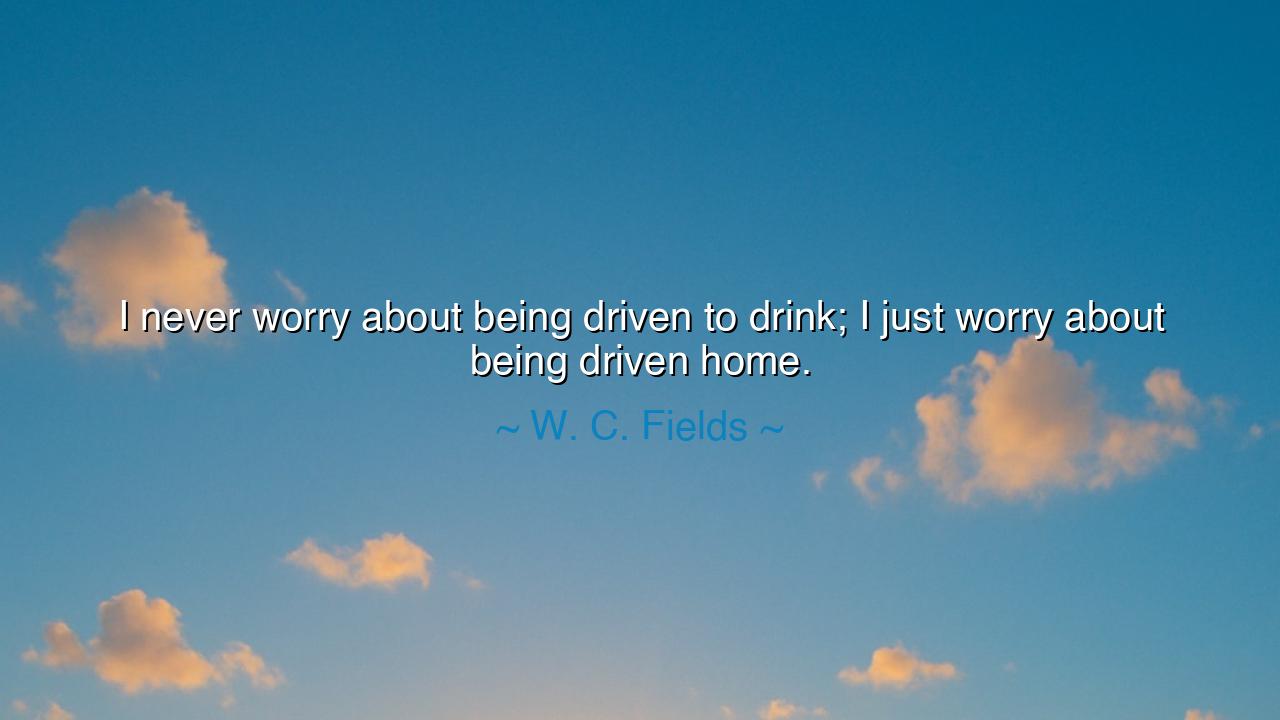
I never worry about being driven to drink; I just worry about






The legendary humorist W. C. Fields, a man whose wit could slice through gloom like sunlight through fog, once quipped: “I never worry about being driven to drink; I just worry about being driven home.” At first glance, this saying seems like mere jest — the clever remark of a man known for his love of laughter and liquor. Yet within it lies a deeper wisdom, wrapped in irony and delight. Beneath its humor, the quote reveals a profound reflection on human folly, self-awareness, and the art of finding balance amid life’s excesses. For even in jest, the wise sometimes hide truth, and Fields was a master of that ancient art.
To understand the meaning of his words, we must first see the play between temptation and consequence. When he says he does not worry about being “driven to drink,” he mocks the old expression used by those who justify their vices — the claim that life’s hardships “drive” them to seek escape in indulgence. Fields, with his dry irony, dismisses this excuse. He implies that he drinks not because he is forced to, but because he chooses to — and that the true danger lies not in the act itself, but in the aftermath. The greater worry, he says, is not drinking, but returning — not losing control for a moment, but finding one’s way back to safety. Thus, in a single line, he reminds us that the real test of any pleasure is whether one can return from it unbroken and unharmed.
In the ancient sense, this saying touches on the eternal struggle between desire and discipline. Every generation, every soul, faces the same trial: to enjoy life’s pleasures without becoming enslaved by them. Wine, laughter, love, ambition — all are sacred gifts, yet each can destroy when taken without measure. Fields’ humor disguises the wisdom of moderation, the golden path praised by philosophers from Aristotle to the Buddha. The man who fears being “driven to drink” fears temptation itself; the man who fears being “driven home” understands the cost of excess. It is not the cup that ruins us, but our failure to stop before it overflows.
In his own life, W. C. Fields embodied this paradox. Born in poverty, he rose to fame as a vaudevillian and film star, crafting a persona built on cynicism and satire. His jokes about drink were many, yet his humor was not celebration but commentary — a mirror held up to a society eager to laugh at its own indulgence. He lived in an age of prohibition and hypocrisy, when public virtue hid private vice. By mocking his own fondness for alcohol, he mocked the moral pretenses of his time. Behind his laughter was the philosopher’s smirk — the understanding that man’s vices are not his downfall until he denies them, and that self-honesty, even about one’s flaws, is a kind of redemption.
The history of humankind is filled with examples of this same truth. Consider the tale of Alexander the Great, who conquered nations yet could not conquer his own desires. In a moment of drunken rage, he killed his dearest friend, and for the rest of his days carried the unbearable weight of that act. The drink itself was not the enemy — it was the untempered spirit, the loss of mastery over oneself. Fields, in his humor, teaches what Alexander learned in sorrow: that one must rule the inner kingdom before ruling the outer world, that pleasure without control becomes a form of self-exile.
The origin of Fields’ wit lies in the wisdom of the jester — that ancient figure who spoke truth under the guise of laughter. Like the fools of Shakespeare’s plays, he understood that humor can soften the blow of truth, allowing wisdom to enter the heart without resistance. His words invite us to laugh, yet through laughter to awaken. He reminds us that the gravest dangers are not always the dramatic ones, but the quiet lapses of judgment that follow moments of joy. The feast is only joyous when one can still rise from the table; the celebration is noble only when it ends in grace.
The lesson, then, is not about drink alone, but about awareness. Whatever your indulgence may be — comfort, pride, ambition, desire — do not let it drive you beyond the reach of reason. Enjoy freely, but return wisely. Laugh deeply, but remember where laughter leads. If you feast, leave the table still a master of your appetite; if you work, do not let labor consume your soul. The danger, as Fields knew, is not in the wine, but in forgetting the way home.
Thus, W. C. Fields, through a single jest, leaves us an inheritance of wisdom disguised as humor. “I never worry about being driven to drink; I just worry about being driven home.” Behind the laughter lies the voice of a sage: warning us that joy without mindfulness becomes folly, and that the true art of living is to dance at the edge of pleasure without falling into its depths. So drink from the cup of life, but drink with awareness. Let your spirit soar — but always know the road back to yourself.






AAdministratorAdministrator
Welcome, honored guests. Please leave a comment, we will respond soon